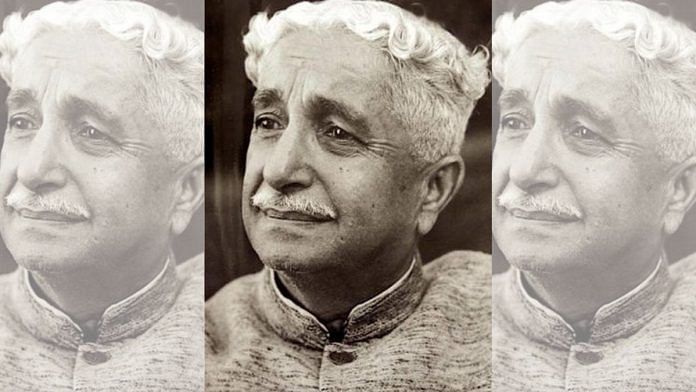In her first address to the nation on the eve of Independence Day, President Droupadi Murmu spoke about Kuppali Venkatappa Puttappa or Kuvempu.
“The great nationalist poet Kuvempu, who enriched Indian literature through Kannada language, had written: Naanu aliwe, Neenu aliwe, Namma elubugala mele Mooduvudu – Mooduvudu Navabharatda leele, which means, ‘I will pass. So will you. But on our bones will arise the great tale of a new India,” she said.
That India’s first President from a tribal community invoked Kuvempu is fitting. The Kannada poet is one of the country’s most celebrated literary figures who spoke out against the caste system and other wrongs through his poems and short stories.
“Have you heard the tunes of the shepherd’s flute in the summertime? When its melody fills your ears, do you check the lineage of the bamboo? Then, why oh why do you cry out and make noise about caste?,” wrote Kuvempu in his poem Kula, a hard-hitting commentary on caste-based discrimination in India. He saw religion and caste as a prison, a “noose” throttling the “development of our nation.” He fought against superstition and for gender equality. Needless to say, his words hold relevance even today.
Also read: Atul Prasad Sen—Bengal’s forgotten musical maestro who wrote lyrics on legal papers
A versatile writer
Born on 29 December 1904 in Hirekodige, a hamlet nestled in Karnataka’s Chikmagalur district, Kuvempu was a prolific writer. His body of work includes novels, short stories, poetry, plays, literary criticisms, autobiographies and essays where nature, beauty, patriotism and love emerge as prominent themes.
Raised in Shivamogga’s Kuppalli, Kuvempu was reportedly homeschooled in the early years of his childhood. He enrolled in Maharaja College of Mysore where he majored in Kannada.
As a student, he motored through William Wordsworth, John Milton, Leo Tolstoy and Thomas Hardy, along with Vivekananda’s selected lectures and Rabindranath Tagore’s Geetanjali. He initially wrote in English, but later switched to Kannada.
“Many don’t know Kuvempu wrote poems in English as early as 1922, bringing out a collection of seven poems titled Beginner’s Muse,” said author and professor Dr Pradhan Gurudatta while speaking at the poet’s Centenary Celebrations in 2004. An expert in Kuvempu’s work, Gurudatta translated his magnum opus, Sri Ramayana Darshanam, into Hindi.
According to Gurudatta, in 1924, Kuvempu met the Irish poet James Cousins who suggested that he write only in Kannada. “Though he was initially disheartened by Cousin’s advice, he later realised his full potential as a poet and a multi-faceted writer in the richness of Kannada,” said Gurudatta.
Also read: Ilaiyaraaja son Yuvan is music icon who stirred Tamils to say ‘I don’t know Hindi, go away’
Sarvodaya and Universal Humanism
Kuvempu’s Sri Ramayana Darshanam, a modern rendering of the Indian Hindu epic Ramayana, is regarded as the revival of the era of great epic poetry. This also earned him the Jnanpith award in 1967—the first for a Kannada writer.
“In the book, Kuvempu expresses the idea of Sarvodaya, wherein every last individual has to be a part of the development process. Kuvempu penned the epic when India was struggling for freedom. This is how Kuvempu became a part of the freedom struggle – through his writing,” noted writer CP Krishnakumar said.
In his adaptation of the Ramayana, the Hindu god Ram also jumps into the fire along with Sita to test himself, defining Kuvempu’s vision of ‘Sarvodaya’, or universal upliftment.
Kuvempu even dabbled in philosophy. His concept of ‘Vishwa Manavatavaad’ or Universal Humanism proposed that humans were born as Vishwa Manav (universal humans) but grew up to be Alpamanav (diminished humans).
He explained this idea further in an essay: “Every child, at birth, is the universal man. But, as it grows, we turn it into a ‘petty man’ (through caste, creed, religion and race). It should be the function of education.”
He was the second Kannada poet to be recognised as ‘Rashtrakavi’ or national poet in 1964. His poem Jaya Bharata Jananiya Tanujate also went on to become Karanataka’s state anthem. He became the eleventh vice chancellor of the University of Mysore in 1956.
Poetry was such an intrinsic part of his life that he even gave poetic names to mundane objects. For instance, he called his house “Udayaravi” (rising sun) and called farmers “Uluva Yogi” (tilling yogi). From the Padma Vibhushan to Sahitya Akademi and Jnanpitha, the poet received honours and mentions throughout his life. Unfortunately, his Padma Vibhushan medal was stolen from his house-turned-museum and was never retrieved.
(Edited by Zoya Bhatti)



